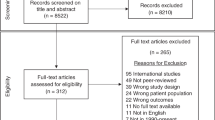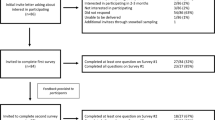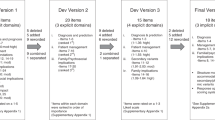Abstract
This article seeks to highlight the most recent trends and themes in genetic counseling that are of broad interest. A total of 3505 documents were published between 1952 and 2021, with a trend toward increase in paper/year. The most common documents are original articles (2515, 71.8%), followed by review articles (341, 9.7%). Journal of Genetic Counseling publishes the highest number of genetic counseling articles (587, 16.7%), followed by Clinical Genetics (103, 2.9%) and the South American Journal of Medical Genetics (95, 2.7%). Co-occurrence analysis revealed five research themes: genetic testing, cancer, genetic counselor, prenatal diagnosis, and psychiatry. The genetic counselor theme contained most of the recent keywords, including “covid-19,” “underrepresented population,” “service delivery models,” “workforce,” “disparities,” “service delivery,” “professional development,” “cultural competence,” “access,” “diversity,” “telemedicine,” and “health literacy.” Genetic counseling researchers may use these keywords to find topics pertinent to their future research and practice.
Similar content being viewed by others
Introduction
The term “genetic counseling” was first coined by an American scientist, Sheldon C. Reed, in 1947 [1]. According to the Ad Hoc Committee of the American Society of Human Genetics, genetic counseling addresses human issues related to the incidence or risk of a genetic disorder in a family [2]. Seymour Kessler later defined genetic counseling as psychological contact or psychotherapy [3]. The 2006 National Society of Genetic Counselors task force described genetic counseling as helping people understand and adapt to the physical, psychological, and familial implications of genetic contributions to disease [4].
Future trends in clinical genetic and genetic services are fast evolving and have been the subject of recent publications [5,6,7,8]. However, the global situation of genetic counseling research, as well as trends and subjects of broad interest in this area throughout the last 70 years, have not been adequately covered since the focus was mainly on specific journals [5] or countries [6,7,8]. We, therefore, mapped genetic counseling research globally using the Scopus database and the VOSviewer tool to provide academics and practitioners in this field, information on the scientific landscape as well as important and emerging themes.
Materials and methods
Search strategy
The literature was searched and retrieved from the Scopus database on January 19, 2022. The Scopus database is regarded as one of the most significant and exhaustive collections of scientific information in the world [9]. The following search string was used in the article title: “genetic counsel*ing”. All document types written in the English language and released between 1952 and 2021 were included, except for erratum. The retrieved documents were subjected to bibliometric analysis using VOSviewer.
Results
Publication outputs
A total of 3505 documents were retrieved. The most common document type was original articles (2515, 71.8%), followed by review articles (341, 9.7%). Letters, book chapters and conference papers, each contributed about 4.7–4.8% of the documents. Notes, editorials, short surveys and books contributed about 4.4% in total. From 1952 to 1967, the document number was one digit. From 1968 to 2010, the number of papers increased to two digits; from 2011 to 2021, it was three digits (Fig. 1).
Journals
The top genetic counseling journals published 1163 documents, accounting for 33.2 per cent of all publications (Table 1). The Journal of Genetic Counseling had 587 publications with a Cite-Score of 3.8 and SJR 2020 of 0.867. Only three journals, the American Journal of Human Genetics, Genetics in Medicine, and Journal of Medical Genetics, have an SJR greater than two. The Scopus database has discontinued its coverage of the two of the top journals, while the American Journal of Medical Genetics has been renamed the American Journal of Medical Genetics, Parts A, B, and C.
Author Keywords
Network visualization of keyword co-occurrence map was constructed with a threshold of nine keyword co-occurrences in VOSviewer. The top keywords ranked by frequency were ‘genetic counseling’ (n = 1156), ‘genetic testing’ (n = 205), ‘prenatal diagnosis’ (n = 104), ‘breast cancer’ (n = 97), ‘genetic counselor’ (n = 68), ‘genetics’ (n = 59), ‘brca1’ (n = 49), ‘education’ (n = 48), ‘brca2’ (n = 45), and ‘hereditary cancer’ (n = 44).
To identify themes in the literature, we studied the terms in each cluster. Five clusters appear from the map in Fig. 2A with the following themes: genetic testing (red cluster), cancer (green cluster), genetic counselor (blue cluster), prenatal diagnosis (yellow cluster) and psychiatry (purple cluster). The overlay visualization of keyword co-occurrence map indicates the publishing dates when specific topics were most popular. Many newer keywords (yellow nodes) were found mainly in the blue cluster (genetic counselor theme) compared to other clusters (Fig. 2B).
Discussion
The increasing number of publications per year may indicate the development trend in the field of genetic counseling. The observed trend may be attributable to the rapid evolution of clinical genetic services [5,6,7,8]. Genetic counselors collaborate with geneticists and other medical specialists to provide genetic counseling services. Genetic counseling research, which strives to improve the quality and availability of genetic counseling services, benefits from these clinical data. Original articles contributed to a large proportion of the publication outputs and increased significantly over the last decade. This finding indicates that the field is expanding in line with the development of genomic medicine [10]. Funding for implementation and outcome research is urgently needed to expand the scientific evidence for genetic counseling practice [10].
The present analysis revealed that 1163 documents or 33.2% of studies were published in the top 10 journals. Of these, more than half of the relevant documents were published in the Journal of Genetic Counseling. This indicates that this is the most active journal publishing a large number of documents and has a substantial impact on the field of genetic counseling. Among the top journals, the results revealed only three journals have SCImago Journal Rank (SJR) greater than two; the American Journal of Human Genetics, Genetics in Medicine, and Journal of Medical Genetics. As a result, it can be deduced that approximately 170 documents, or 4.9% of all genetic counseling publications, were published in high-impact journals.
The keyword co-occurrence map identified five major clusters in the genetic counseling field (Fig. 2A). These are genetic testing (red cluster), cancer (green cluster), genetic counselor (blue cluster), prenatal diagnosis (yellow cluster) and psychiatry (purple cluster) themes. Some of these topics (cancer and prenatal) have earlier been identified by content analysis study [5]. Genetic counseling should be regarded as an integral part of the genetic testing process [11]. Thus, genetic testing appeared as the main theme with the largest cluster. There are several categories of genetic testing that require genetic counseling. In diagnostic genetic testing, the test is performed on symptomatic individuals. While pre-test genetic counseling may not always be necessary, post-test genetic counseling should be offered especially when the result is positive. Conversely, pre-and post-test genetic counseling should be offered in other types of genetic testing such as predictive, susceptibility (risk), carrier, prenatal, preimplantation genetic diagnosis (PGD), and genetic screening. For pharmacogenetic testing, the need for genetic counseling will depend on whether the results have other implications rather than decisions about drug treatment [11].
The second theme in the genetic counseling field is cancer. Pathogenic variants in genes can be broadly grouped into sporadic, familial, and hereditary cancers. Sporadic cancers, making up 75–80% of all cancers, are caused by acquired mutations in tumour cells. About 10–20% of cancers are familial but not caused by a gene mutation. On the other hand, familial cancers are attributed to shared family factors. Finally, hereditary cancer is evaluated when a person has a maternal or paternal family history with suggestive symptoms, depending on the type of cancer and specific hereditary syndrome. More studies are needed to build a cancer genetic counseling service to enable fair access for all patients [12]. In order to establish a cancer genetic counseling service, more studies are needed to look into the requirements and obstacles of patients, family members, and specialists particularly, in different settings/countries to ensure equitable access to all patients [12].
Genetic counselor, the third theme, is a health practitioner who has been trained to evaluate genetic testing results, both scientifically and medically, while also considering psychological, ethical, and family concerns [13]. The genetic counselor theme has the highest number of recent keywords based on the number of yellow nodes (Fig. 2B). These keywords with the average publication year 2018 onwards include ‘covid-19’, ‘underrepresented population’, ‘service delivery models’, ‘workforce’, ‘disparities’, ‘service delivery’, ‘professional development’, ‘cultural competence’, ‘access’, ‘diversity’, ‘telemedicine’ and ‘health literacy’. These keywords are related to the genetic counselors’ challenges and needs related to genetic service delivery models.
The fourth theme in the genetic counseling field is prenatal diagnosis. The need for prenatal genetic counselling is increasing worldwide due to advances in prenatal screening and diagnostic tests [14]. Given the complexity of genetic testing information, the role of genetic counseling at pre-and post-test is to increase knowledge, decrease anxiety, avoid decisional conflicts, and aid in the interpretation of test results, thereby helping an individual make an informed decision [14, 15].
The last theme in the genetic counseling field is psychiatry. Psychiatric genetic counseling has benefits for people with psychiatric disorders and their families despite the limited genetic testing available [16,17,18]. The role of genetic counseling is to help people understand that mental illness is not their fault, but there are things that they can do to protect their mental health [19]. It is an emerging speciality within clinical genetics [20].
The main limitation of our study is that, despite Scopus’ vast coverage [9], we might have overlooked some important studies in other databases. Second, new research is being released almost daily, and the data in this analysis was up to January 19, 2022. Third, we might have missed several relevant documents if the authors had not included the term “genetic counseling” in the article titles. Lastly, the research themes in this study were derived from keyword co-occurrence thematic analysis without a deeper analysis.
Conclusions
The field of genetic counseling is growing as genomic medicine develops. Genetic counseling research has identified the following themes: genetic testing, cancer, genetic counselor, prenatal diagnosis, and psychiatry. Future directions in genetic counseling research may be related to the requirements and challenges of genetic counselors, according to the emerging topics.
Data availability
The datasets generated during and/or analysed during the current study are available from the corresponding author on reasonable request.
References
Reed SC. A short history of genetic counseling. Soc Biol. 1974;21:332–9. https://doi.org/10.1080/19485565.1974.9988131.
Genetic counseling. Am J Hum Genet. 1975;27:240–2. https://www.ncbi.nlm.nih.gov/pmc/articles/PMC1762759/pdf/ajhg00435-0108.pdf.
Kessler S. Psychological aspects of genetic counseling. ix. Teaching and counseling. J Genet Couns. 1997;6:287–95. https://doi.org/10.1023/A:1025676205440.
Resta R, Biesecker BB, Bennett RL, Blum S, Hahn SE.National Society of Genetic Counselors’ (NSGC) Definition Task Force et al. A new definition of Genetic Counseling: National Society of Genetic Counselors’ Task Force report. J Genet Couns. 2006;15:77–83. https://doi.org/10.1007/s10897-005-9014-3.
Wallgren A, Veach PM, MacFarlane IM, Leroy BS. Content analysis of Journal of Genetic Counseling research articles: A multi-year perspective. J Genet Couns. 2021;30:774–84. https://doi.org/10.1002/jgc4.1373.
Singha OP, Chetry DM, Dey NC. Genetic counseling in India: A bibliometric study. Libr Philos Pract. 2021. https://digitalcommons.unl.edu/libphilprac/5682/.
Kim N, Kong SY, Yoo J, Kim DH, Seo SH, Kim J. Current issues, challenges, and future perspectives of genetic counseling in Korea. Ann Lab Med. 2022;42:314–20. https://doi.org/10.3343/alm.2022.42.3.314.
Borle K, Kopac N, Dragojlovic N, Rodriguez Llorian E, Friedman JM.GenCOUNSEL Study. et al. Where is genetic medicine headed? Exploring the perspectives of Canadian genetic professionals on future trends using the Delphi method. Eur J Hum Genet. 2022;30:496–504. https://doi.org/10.1038/s41431-021-01017-2.
Pranckute R. Web of Science (WoS) and Scopus: The titans of bibliographic information in today’s academic world. Publications. 2021;9:12. https://doi.org/10.3390/publications9010012.
Patch C, Middleton A. Genetic counselling in the era of genomic medicine. Br Med Bull. 2018;126:27–36. https://doi.org/10.1093/bmb/ldy008.
EuroGentest Network of Excellence - www.eurogentest.org.
Ciucă A, Moldovan R, Băban A. Developing genetic counselling services in an underdeveloped healthcare setting. J Community Genet. 2021;12:539–48. https://doi.org/10.1007/s12687-021-00546-z.
The Topol Review. Preparing the healthcare workforce to deliver the digital future. 2019. https://topol.hee.nhs.uk/.
Yeşilçinar İ, Güvenç G. Counselling and education for prenatal screening and diagnostic tests for pregnant women: Randomized controlled trial. Int J Nurs Pr. 2021;27:e13000. https://doi.org/10.1111/ijn.13000.
Ramesh A, Parvathi VD. Prenatal diagnosis: A connotation on genetic counseling being indispensable. Indian J Public Health. 2020;64:83–85. https://doi.org/10.4103/ijph.IJPH_116_19.
Austin J, Honer W. The potential impact of genetic counseling for mental illness. Clin Genet. 2004;67:134–42. https://doi.org/10.1111/j.1399-0004.2004.00330.x.
Hippman C, Lohn Z, Ringrose A, Inglis A, Cheek J, Austin JC. “Nothing is absolute in life”: understanding uncertainty in the context of psychiatric genetic counseling from the perspective of those with serious mental illness. J Genet Couns. 2013;22:625–32. https://doi.org/10.1007/s10897-013-9594-2.
Inglis A, Koehn D, McGillivray B, Stewart SE, Austin J. Evaluating a unique, specialist psychiatric genetic counseling clinic: uptake and impact. Clin Genet. 2015;87:218–24. https://doi.org/10.1111/cge.12415.
Austin JC. (2020). Evidence-based genetic counseling for psychiatric disorders: a road map. Cold Spring Harb Perspect Med. 2020;10:a036608. https://doi.org/10.1101/cshperspect.a036608.
Moldovan R, McGhee KA, Coviello D, Hamang A, Inglis A, Ingvoldstad Malmgren C. et al. Psychiatric genetic counseling: A mapping exercise. Am J Med Genet B: Neuropsychiatr Genet. 2019;180:523–32. https://doi.org/10.1002/ajmg.b.32735.
Funding
This research received no specific grant from any funding agency in the public, commercial, or not-for-profit sectors.
Author information
Authors and Affiliations
Contributions
WNAZ designed the study; RZ and AW contributed to data extraction and prepared the first draft of the manuscript; and all authors reviewed and provided feedback on the manuscript.
Corresponding author
Ethics declarations
Competing interests
The authors declare no competing interests.
Additional information
Publisher’s note Springer Nature remains neutral with regard to jurisdictional claims in published maps and institutional affiliations.
Rights and permissions
Springer Nature or its licensor (e.g. a society or other partner) holds exclusive rights to this article under a publishing agreement with the author(s) or other rightsholder(s); author self-archiving of the accepted manuscript version of this article is solely governed by the terms of such publishing agreement and applicable law.
About this article
Cite this article
Zakaria, W.N.A., Yoon, SY., Wijaya, A. et al. Global trends and themes in genetic counseling research. Eur J Hum Genet 31, 1181–1184 (2023). https://doi.org/10.1038/s41431-023-01371-3
Received:
Revised:
Accepted:
Published:
Issue Date:
DOI: https://doi.org/10.1038/s41431-023-01371-3
This article is cited by
-
Expanding what we know about rare genetic diseases
European Journal of Human Genetics (2023)





